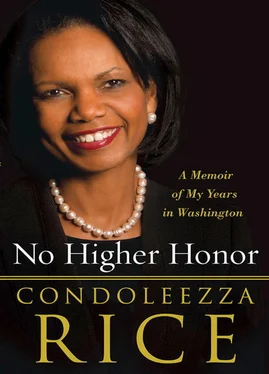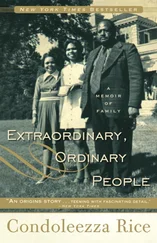Yet the defining moments that laid the foundation for victory in the Cold War had come in the dark days of Josef Stalin and Nikita Khrushchev. Ronald Reagan had issued the final challenge to the Soviet Union at the dawn of the 1980s, calling it an evil empire and pushing through huge defense budgets that spent it into the Ice Age.
By the time George H. W. Bush came to power, the Soviet Union was a spent force. It was not easy to shepherd a dying but still dangerous superpower to collapse. Unifying Germany on Western terms and sustaining the forward momentum of freedom in Eastern Europe was difficult. But the Soviet Union was in its twilight, and enlightened leaders such as Mikhail Gorbachev and his foreign minister, Eduard Shevardnadze, knew it. In 2001 it fell to George W. Bush to confront a new and rising threat in al Qaeda and its extremist kin, full of bravado and revolutionary zeal, and to lead at the beginning of a new and dangerous historical epoch.
In 1999 the scope of that challenge was not yet evident. The Reagan Library speech laid out a broad, if somewhat conventional, foreign policy agenda, including a plan for dealing with great powers such as Russia and China. It also anticipated the arrival of India, the world’s largest democracy, as a power of global significance, and vowed to strengthen U.S. ties by increasing trade and investment. I later elaborated on those themes in a Foreign Affairs article that winter. But a centerpiece of the foreign policy agenda drew on the governor’s knowledge of and interest in Latin America and as such represented a departure. In a speech in Miami, Florida, in August 2000, the governor spoke about the centrality of the “neighborhood.” He vowed to make Latin America a fundamental concern of his foreign policy, emphasizing strong ties to Mexico, renewed promotion of hemispheric free trade, and sustained support for freedom and democracy across the Americas.
Our first opportunity to put this promise into practice came in February 2001 with the President’s first foreign trip. The President’s foreign itinerary is made up both of trips that he must take—for example, to NATO summits and G8 meetings—and trips that he makes to push an initiative. The decision to make the first trip a visit to President Vicente Fox at his ranch in San Cristóbal, Mexico, was meant to send a strong signal that Latin America would be first among equals in Bush foreign policy.
The trip was intended to showcase not just the pivotal importance of Latin America in general but that of Mexico in particular. Fox and Bush had met in Dallas shortly after they had been elected. They’d sketched out a broad agenda: strengthening trade, modernizing the border, reforming immigration, and pushing a free-market approach for the entire region. Years before as governors, they’d known each other and had great mutual respect.
Mexico was in the midst of a democratic transformation, marked by Fox’s election win, the first time the opposition party had triumphed in seventy-one years. Fox’s predecessor, Ernesto Zedillo, had ushered in a new brand of clean personal politics, telling people that he intended to leave office no richer than when he’d arrived. Fox stood for the next important step: Mexico’s institutional maturation as a democracy and the peaceful transfer of power from one party to another.
George W. Bush understood the significance of Vicente Fox, and he wanted to be his friend and supporter as he took on the entrenched interests and corruption that prevented Mexico from moving forward economically and socially. Mexico and the United States have a long, mostly unhappy history with each other. We fully intended to highlight Mexico’s importance and U.S. humility.
On the morning of February 16, 2001, we boarded Air Force One at 8:00 A.M. We landed in Guanajuato, Mexico, and were met by Fox and his soon-to-be wife, Marta Sahagún, who’d been his press secretary. Fox is a giant of a man, dark and handsome, and it struck me that he could easily have been cast in a movie as a Mexican hacienda owner of the late nineteenth century. In fact, he’s a former international businessman who was the chief executive for Coca-Cola de México and speaks perfect English. Nonetheless, he looks as though he’d be right at home on a great stallion, and in fact, riding is an activity that he loves. He was reportedly disappointed when the White House let it be known that there would be no horseback riding, something President Bush did not enjoy.
Before going to the ranch, we stopped to say hello to President Fox’s eighty-one-year-old mother. We all waited in the car while the two presidents went into a house that spoke volumes about Fox’s modest beginnings. The short ride to the ranch was pleasant, with Mexican citizens out in significant numbers to greet the President. They were waving U.S. flags. Well, in every country the people along the motorcade route wave U.S. flags, unless they are protesting something that the United States has done. This time the spectators were all friendly.
We arrived at the ranch, which didn’t look like a ranch at all—at least not my conception of one. It was a magnificent series of houses arrayed across a picturesque Mexican landscape. The discussions were held on the partially enclosed multicolored-tile-and-white-stucco patio of the largest house, overlooking the serene countryside. Sitting around the large wooden table, I thought, All is going exactly as it should . U.S.-Mexican relations were off to a terrific start.
About an hour into the discussion, I caught sight of Ari Fleischer, our peripatetic press secretary. Ari had sharp elbows and battled with the press on a daily basis, but our relationship was cordial and sound. We had talked early on about the need for the national security advisor and the press secretary to develop a relationship of trust. Ari would stop in every morning to get the latest updates and develop a line of attack—or defense—on the issues of the day. I told him that there would be times when I couldn’t talk about issues but that I would never deceive him.
I couldn’t imagine what Ari wanted, but he was clearly motioning, with increasing urgency, for me to leave the table and talk to him. I was reluctant since I was seated next to the President. But Ari was by now in some measure of distress. When I excused myself and reached him, he asked, “Why are we bombing Baghdad?”
“What?” I said.
“The press is telling me that we are bombing Baghdad,” Ari said. “Their cell phones are going crazy.”
I went back toward the table and motioned to Colin Powell, then Karen Hughes. Pretty soon it looked like one of those television shows where one participant after another leaves until there is only one. I can’t imagine what the Mexicans thought. Here we were, writing a new chapter in U.S.-Mexican relations amid some very obvious distractions. The President finally stopped in midsentence and asked rather agitatedly, “What’s going on?” I whispered to the President that something was happening in Iraq and I would get back to him. Needless to say, the moment was pretty much ruined.
I made a series of panicked phone calls to Washington and got Steve Hadley on the phone. He called the Pentagon and learned that during a “routine” overflight of Iraqi airspace we’d gotten, as he put it in his understated way, “a little close to the air defenses of Baghdad.” We had, it seemed, set off every air-raid siren within shouting distance of the city. There wasn’t much time for a full accounting of exactly how that had happened. We hurriedly wrote press guidance that explained that the United States, as a part of its obligations under the armistice terms that had ended the Persian Gulf War in 1991, was flying patrols to keep Saddam Hussein from using his aircraft against his own people or his neighbors. They were called “no-fly zones.”
Читать дальше












